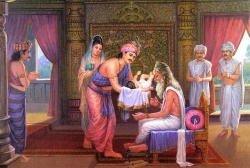Difference between revisions of "Shuddhodana"
(Created page with "thumb|250px| <poem> Suddhodana was the ruler of the Sakyā tribe and the father of Siddhattha Gotama.The name means ‘Pure Rice.’ Traditionally, Suddhoda...") |
m (Text replacement - "The Buddha" to "The Buddha") |
||
| (3 intermediate revisions by one other user not shown) | |||
| Line 1: | Line 1: | ||
[[File:0437.jpg|thumb|250px|]] | [[File:0437.jpg|thumb|250px|]] | ||
<poem> | <poem> | ||
| − | Suddhodana was the ruler of the Sakyā tribe and the father of Siddhattha Gotama.The name means | + | [[Suddhodana]] was the ruler of the Sakyā tribe and the father of [[Siddhattha]] [[Gotama]].The name means ‘[[Pure]] Rice.’ [[Traditionally]], [[Suddhodana]] is said to have been a great [[king]] but he was probably more like a ruler elected by the Sākyan tribal [[Council]]. Most courts in ancient [[India]] had a [[Body]] of men called ‘[[king]] makers’ (rājakattāro, D.II,233). No [[Doubt]] it was such a group who elected [[Suddhodana]] to rule over them and the rest of the tribe. [[Suddhodana]] had two wives – Mahā [[Māyā]] who was Siddhattha’s mother and who [[died]] soon after his [[birth]], and Mahā Pajāpatī Gotamī who became his step-mother. [[Suddhodana]] was very critical of his son’s [[Desire]] to renounce the [[World]] but eventually became his supporter and [[Disciple]]. |
| − | Shuddhodana | + | [[Shuddhodana]] |
| − | [浄飯王] (Skt; Pali Suddhodana; Jpn Jobonno) | + | [浄飯王] (Skt; [[Pali]] [[Suddhodana]]; Jpn Jobonno) |
| − | A king of Kapilavastu in northern India and the father of Shakyamuni. According to the Sutra of the Collected Stories of | + | A [[king]] of [[Kapilavastu]] in northern [[India]] and the father of [[Shakyamuni]]. According to the [[Sutra]] of the Collected Stories of The [[Buddha]]'s [[Deeds]] in Past [[Lives]], [[Shuddhodana]] was the eldest son of [[King]] [[Simhahanu]]. Shuddhodana's wife, [[Maya]], [[died]] seven days after giving [[birth]] to [[Shakyamuni]], after which he married [[Maya]]'s younger sister, [[Mahaprajapati]]. With [[Mahaprajapati]], he had another son, [[Nanda]]. [[Shuddhodana]] originally opposed his son [[Shakyamuni]]'s [[Desire]] to renounce the secular [[World]] and lead a [[religious]] [[Life]], but when [[Shakyamuni]] returned to his home [[Kapilavastu]] as The [[Buddha]] after his [[Awakening]], [[Shuddhodana]] converted to The [[Buddha]]'s teachings. Five years after [[Shakyamuni]]'s [[Enlightenment]], [[Shuddhodana]] is said to have [[died]] of illness at age seventy-nine (ninety-seven according to another account). The name [[Shuddhodana]] is rendered in {{Wiki|Chinese}} translations of [[Sutras]] as "[[Pure]] Rice." |
</poem> | </poem> | ||
{{R}} | {{R}} | ||
[http://www.sgilibrary.org/search_dict.php www.sgilibrary.org] | [http://www.sgilibrary.org/search_dict.php www.sgilibrary.org] | ||
[[Category:Buddhist Terms]] | [[Category:Buddhist Terms]] | ||
| − | [[Category: | + | [[Category:Suddhodana]] |
Latest revision as of 17:03, 12 September 2013
Suddhodana was the ruler of the Sakyā tribe and the father of Siddhattha Gotama.The name means ‘Pure Rice.’ Traditionally, Suddhodana is said to have been a great king but he was probably more like a ruler elected by the Sākyan tribal Council. Most courts in ancient India had a Body of men called ‘king makers’ (rājakattāro, D.II,233). No Doubt it was such a group who elected Suddhodana to rule over them and the rest of the tribe. Suddhodana had two wives – Mahā Māyā who was Siddhattha’s mother and who died soon after his birth, and Mahā Pajāpatī Gotamī who became his step-mother. Suddhodana was very critical of his son’s Desire to renounce the World but eventually became his supporter and Disciple.
Shuddhodana
[浄飯王] (Skt; Pali Suddhodana; Jpn Jobonno)
A king of Kapilavastu in northern India and the father of Shakyamuni. According to the Sutra of the Collected Stories of The Buddha's Deeds in Past Lives, Shuddhodana was the eldest son of King Simhahanu. Shuddhodana's wife, Maya, died seven days after giving birth to Shakyamuni, after which he married Maya's younger sister, Mahaprajapati. With Mahaprajapati, he had another son, Nanda. Shuddhodana originally opposed his son Shakyamuni's Desire to renounce the secular World and lead a religious Life, but when Shakyamuni returned to his home Kapilavastu as The Buddha after his Awakening, Shuddhodana converted to The Buddha's teachings. Five years after Shakyamuni's Enlightenment, Shuddhodana is said to have died of illness at age seventy-nine (ninety-seven according to another account). The name Shuddhodana is rendered in Chinese translations of Sutras as "Pure Rice."
